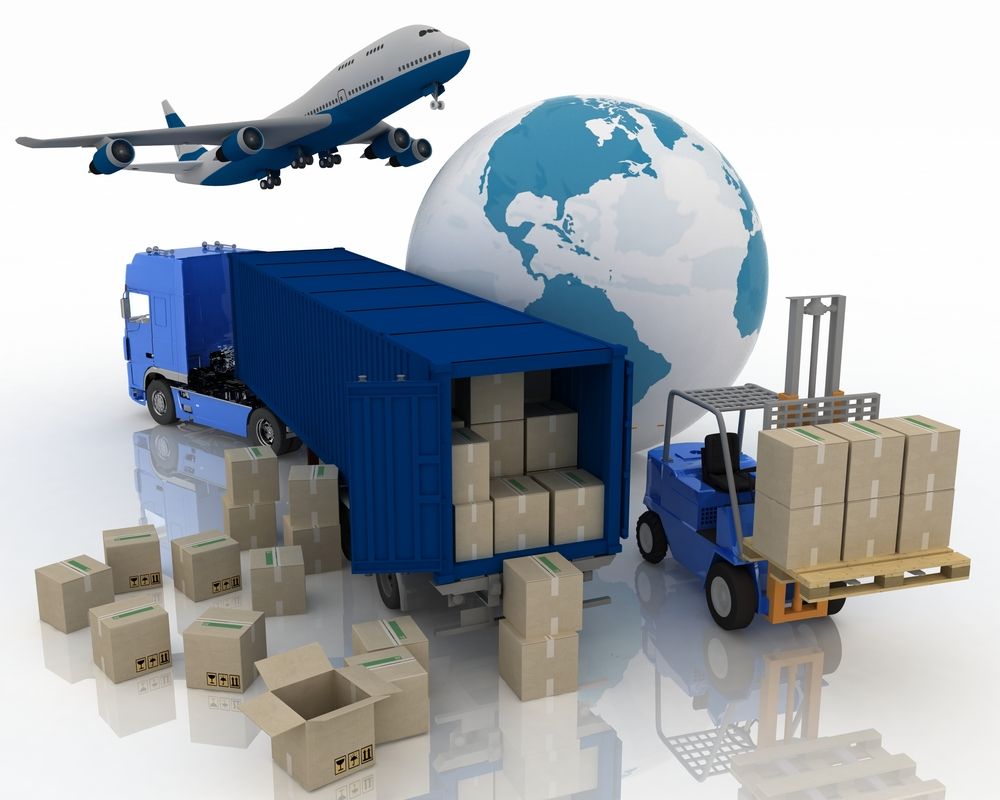
LOGISTICS: transportation, storage, delivery

A retailer at a crossroads: price or quality?
The actions of most domestic entrepreneurs during periods of crisis are quite the same. As practice shows, as in the 1998 and 2009 years, now consumers of logistics services are beginning to pay attention primarily to their price, completely forgetting about quality. However, the poor quality of services is fraught with significant losses for the business.
What will happen to the logistics market in the context of the ongoing crisis, you ask? Of course, serious changes await him. Small logistics structures that operate in the low-priced services education sector with a low share of modernization and low labor productivity will disappear from the market. They will be joined by those logistics companies that adhered to the strategy of exponential growth and capture the maximum market share. The scope of the management was not supported by the financial capabilities of shareholders, who, in a recession, simply ran out of resources for development.
The decrease in demand in the logistics services market has occurred in different directions. In premium logistics, the drop in newly attracted services amounted to 25-30%. On the other hand, at 10-15%, stocks of already contracted customers at the same logistics operators increased due to a drop in consumer demand from the public and external customer companies. Accordingly, the decreased traffic on processing goods in warehouse operations.
In ordinary logistics, approximately the same indicators of a decrease in ordered logistics services. But the problem is in ordinary logistics, where there is a low level of automation and skill, customers are more susceptible to changes in market conditions and more serious pressure to reduce prices for logistics services. Such logistics is carried out mainly in warehouses of class "B", "C" and "D" with low technical parameters and the client always has a set of arguments that cannot be ignored in a crisis, and accordingly, such logistics operators have to reduce prices additionally due to fear of losing existing customers and the inability to attract new ones to replace.
Price wars
Price changes in one direction or another always occur and this, first of all, depends on the client himself. It is easy to play at a price when the stock goods, the number of personnel involved is small, since the goods are not moved and not processed. It is a completely different matter to lower prices for services for active transnational customers with their huge turnover and a rigid supply chain to key networks. In relative terms, the price indicator for a number of items can fluctuate in premium logistics in the range of plus or minus 10%. In ordinary logistics, this range is much higher and can be in the range of plus or minus 20%. There is also a big difference in the price deviation for logistics services in the regions, excluding Moscow and partially St. Petersburg, where there is a significant decline in customer activity in warehouse logistics.
Dumping has always been an “anti-market” strategy that has spoiled a lot of blood for professional logistics operators. Now in business everything is quite transparent and it is quite easy to calculate the cost of operations and the profitability of business processes. And if companies appear on the market that offer logistics services two times cheaper than the market, then there are only two explanations:
- companies go broke and try to cling to the market by any means, including low prices at a loss to themselves;
- when, for various reasons, a significant number of narrow aisle racks appeared on the market, which allows keeping slightly above "zero" even at low prices.
However, for the premium logistics sector, where highly qualified personnel and developed technologies of business processes, from two sides: both from the side of the logistics provider and from the side of the consumer of services - the price consensus is reached faster.
In the premium logistics sector, an increase in prices for basic operations is projected. It would seem a crisis and how can this be? However, first of all, because the contracts concluded by 3-4 years ago, are still working at the tariffs of those years. Secondly, over the past three years, cumulative inflation amounted to about 30%, by the end of 2015 of the year, another 15-20% will be added. Thirdly, the ruble depreciated almost twice from 30 rubles per dollar to almost 60 rubles. And as you know in the logistics costs, the share of employee wages and salaries is approximately 30-40%, which cannot but put pressure on the price. Thus, we should expect a correction in the cost of logistics services by approximately 15-20% by the second half of this year.
Full out
Outsourcing turned out to be one of the ways to optimize logistics processes and costs for the company. In difficult conditions of the crisis market, this service was very popular.
According to business analysts, in the 2015 year, the outsourcing market for transport and logistics services will exceed 800 billion rubles, with the market growing at about 20%. This conclusion was reached by analysts at City Express, a major Russian logistics operator. According to experts, a comparative analysis of the structure of changes in product portfolios in the logistics market, as well as an analysis of the dynamics of changes in the client portfolio for the 2007-2009 and 2013-2014 years, shows that in economically unstable periods, companies actively transfer logistics services to outsourcing.
According to the analysis of the logistics services market, more than 30% of companies in Russia now outsource their logistics operations. The explosive growth of e-commerce and the development of online stores are believed to be the main driver of this market's growth. According to the experts of J'son & Partners Consulting, the next three years, sales via the Internet (including footwear) will grow by about 20-25% per year.
On the other hand, the country's economic situation is difficult and strong competition forces most retailers to maximize cost optimization, which in turn stimulates the growth of the logistics services outsourcing market. And as consumer interest in FMCG segment goods continues to grow, primarily in footwear in the regions, manufacturers and retailers are interested in the quality service of logistics companies.
In the current situation, in order to maintain and strengthen the position of business, participants in the logistics market must constantly improve their own competitiveness. The main points of growth are the offers of industry-specific logistics solutions that meet the maximum requirements of the clients' business, the development of the autonomy of regional transport routes.
But the “fulfillment” segment has the greatest development potential - outsourcing of internal logistics and inventory management, whose share in Russia is about 12-14%. Realization of this potential will allow bringing the logistics business in Russia to a fundamentally new level.
According to the General Director of Optima Logistics, Georgy Vlastopulo, the main thing now is to resist external and internal negative factors and keep what has been gained and leave an opportunity for business development. “Outsourcing provides a lot of opportunities. First of all, this is a reduction in the risks associated with logistics and customs activities, which are transferred to the outsourcing company. At the same time, risks are protected not only conceptually, but also legally. Focusing occurs
on the main competencies, the release of administrative resources, which allows you to implement the secondary processes of the company and get additional competitive advantages. Decrease in capital investments in the non-core area of the company's activity, and, as a result, the emergence of free funds to improve the efficiency of their own business ... "
Running away from problems
Over the years of practice, many shoe retailers have abandoned the wording "Difficulties", re-qualifying them into tasks and careful detailing in the context of the industry, product nomenclatures, etc. If you have knowledge and experience, then any product requiring customs clearance must be algorithmic and consistent. If you know the process, then its implementation takes place in the most comfortable conditions for all participants.
When making shoes, the following features should be considered:
1. All footwear is divided by belonging to the brands "luxury" - the most famous brands, "comfort" - the declared trademarks, "unnamed" - trademarks that are not present in the first two categories. There are different levels of customs risk for each category. The customs value index for the risk management system is formed "per pair", but the customs authorities also control the cost "per kg". Certain trademarks are included in the Register of Intellectual Property Objects, for this product it is required to obtain permission from the copyright holder of this trademark on the territory of the Russian Federation (if the recipient is not included in the list of official suppliers of the trademark
2. HS Code. It is important to correctly determine the correct code in order to check the same risks and determine the customs payments.
For this, it is necessary to obtain a detailed description of the goods (especially for special, protective and sports shoes) in the context of: name of the shoe (boots, boots, shoes, etc.); sole material; top material; method of attaching the sole and top; top height (closes the ankle, knee, etc.); purpose (sports, work, etc.); affiliation (children's, male, female); the presence of add. processing (sockets, straps, perforation, metallic. toe cap, etc.); insole length (in cm); heel height, etc.
“I would like to note separately,” explains Georgy Vlastopulo, “that there are additional conditions for children's shoes (insole length up to 24 cm). She is given a preference - 10% VAT (instead of 18% VAT), Resolution of the Government of the Russian Federation of December 31, 2004 N 908 "On approval of the lists of codes for types of food products and goods for children subject to value added tax at a tax rate of 10 percent" ...
In addition, for the certification, a detailed description of the goods is required, and for children's shoes and special shoes, which are personal protective equipment, also the provision of samples for examination in laboratories:
- TR CU 017/2011 "On the safety of light industry products"
- TR CU 019/2011 "On the safety of personal protective equipment".
- TS 007/2011 "On the safety of products intended for children and adolescents."
And finally, the search. This process in the shoe industry is also individual. Unlike a number of other product groups, inspection can be carried out not only for each article, but also for each size, color of the article. All labels, composition of materials, marking of boxes, etc. are studied in detail. In total, as in any process, experience, knowledge and reliable partners are needed. Having all the knowledge and papers, you can be sure of the success of the event.
With pine forest
In crisis conditions, importers use another fairly common method - groupage cargo. Due to surges in the value of currencies, announced sanctions, fluctuations in consumer demand, investing in large quantities of goods is too adventurous. In this regard, the majority of importers use the splitting of supplies and the formation of a warehouse stock outside the territory of the Russian Federation. What does it do?
“We can expand the assortment group of goods sold without reference to a specific manufacturer and country of origin,” comments Georgy Vlastopulo. - You can import trial small consignments of goods. In addition, it is very important not to have a warehouse stock on the territory of the Russian Federation, respectively, to ensure a quick turnover of investments. The best thing today and in today's situation is to import the required amount of goods for existing needs ... "
In addition, some companies are gradually moving from direct lease to safekeeping services. For small companies, renting excess warehouse space and maintaining warehouse personnel is very expensive. And during an economic downturn, many owners think about optimization. One option is to outsource the warehouse function. As you can see, it is enough to study all the possibilities and available options in order to save good money, which is especially important in a crisis. However, in pursuit of a low price, you should not sacrifice the quality of logistics services, since overlaps with deliveries and possible problems with customs clearance will cost you much more than "saving".
| Please rate the article |
Materials on the topic
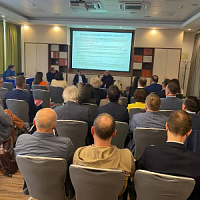
Results of the round table of shoemakers with the Ministry of Industry and Trade of the Russian Federation, CRPT, NOBS and Wildberries

World Footwear Yearbook: Global footwear production reaches 23,9 billion pairs and is back to pre-pandemic levels
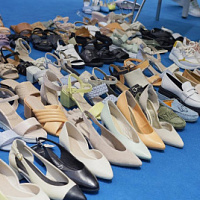
How to double the sales of a shoe store?
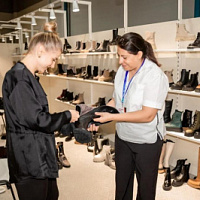
New direction of exhibitions in Alma-Ata: Euro Shoes @ Elite Line & CAF
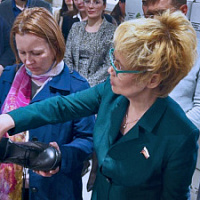
Round table with representatives of shoe factories of Dagestan with the support of the Ministry of Industry and Trade and NOBS
Popular
 Coach turned to Big Data analysis and won the interest of a young audience
American handbag brand Coach has planned the success of its Tabby model among a younger audience, Generation Z, by turning to big data analysis, abandoning traditional and analogue tools, such as human intuition or the ability of any executive to sense “which way the wind will blow,” writes B.O.F.
Coach turned to Big Data analysis and won the interest of a young audience
American handbag brand Coach has planned the success of its Tabby model among a younger audience, Generation Z, by turning to big data analysis, abandoning traditional and analogue tools, such as human intuition or the ability of any executive to sense “which way the wind will blow,” writes B.O.F.
 IDOL updates the concept
The IDOL brand, part of the Melon Fashion Group portfolio, opened the first flagship in an updated concept in the Aviapark shopping center in Moscow.
IDOL updates the concept
The IDOL brand, part of the Melon Fashion Group portfolio, opened the first flagship in an updated concept in the Aviapark shopping center in Moscow.
 Seven “sins” of the shoe business. How do owners harm the company with their own hands?
Why is Company X able to create a strong, profitable brand, but Company Y is struggling to make ends meet? Many people prefer to attribute success to luck, luck, or the support of strong patrons. And few people ask themselves the question: “What am I doing wrong?” Moreover, many entrepreneurs begin to harm their business from the first day of its opening. In this article, together with SR expert in the field of fashion business management and development, Maria Gerasimenko, we will look at the 7 main “sins” that business owners commit using specific examples.
Seven “sins” of the shoe business. How do owners harm the company with their own hands?
Why is Company X able to create a strong, profitable brand, but Company Y is struggling to make ends meet? Many people prefer to attribute success to luck, luck, or the support of strong patrons. And few people ask themselves the question: “What am I doing wrong?” Moreover, many entrepreneurs begin to harm their business from the first day of its opening. In this article, together with SR expert in the field of fashion business management and development, Maria Gerasimenko, we will look at the 7 main “sins” that business owners commit using specific examples.
 Louis Vuitton opens a new factory in Italy
Louis Vuitton has opened its second shoe factory in Italy. After opening the first one in Fiesso d'Artico in Veneto, the LVMH flagship brand has just opened a new production site dedicated to this category of footwear in the industrial zone of Civitano in the Marche region. There is also another brand production facility in Tuscany, where bags and leather accessories are produced, writes fr.fashionnetwork.com.
Louis Vuitton opens a new factory in Italy
Louis Vuitton has opened its second shoe factory in Italy. After opening the first one in Fiesso d'Artico in Veneto, the LVMH flagship brand has just opened a new production site dedicated to this category of footwear in the industrial zone of Civitano in the Marche region. There is also another brand production facility in Tuscany, where bags and leather accessories are produced, writes fr.fashionnetwork.com.
 The Euro Shoes@CAF exhibition will be held in Almaty
From March 11 to 13, the Euro Shoes@CAF (Central Asia Fashion) exhibition will be held in Almaty at the Atakent exhibition complex. The exhibition, which is the largest international event in the fashion industry in Central Asia, will present collections of clothing, shoes and accessories.
The Euro Shoes@CAF exhibition will be held in Almaty
From March 11 to 13, the Euro Shoes@CAF (Central Asia Fashion) exhibition will be held in Almaty at the Atakent exhibition complex. The exhibition, which is the largest international event in the fashion industry in Central Asia, will present collections of clothing, shoes and accessories.
 Euro Shoes will start operating on February 19 in Moscow!
The winter session of the international exhibition of footwear and accessories Euro Shoes premiere collection will be held in Moscow at the Expocenter from February 19 to 22. The organizers promise the presence of all the main participants at the exhibition, as well as new names from Europe, Asia and Russia.
Euro Shoes will start operating on February 19 in Moscow!
The winter session of the international exhibition of footwear and accessories Euro Shoes premiere collection will be held in Moscow at the Expocenter from February 19 to 22. The organizers promise the presence of all the main participants at the exhibition, as well as new names from Europe, Asia and Russia.
 American buyers couldn't buy Birkin bags and sued Hermès
French fashion house Hermès is facing a lawsuit in California from two customers who were unable to purchase exclusive Birkin bags. The fashion house is accused of unfair commercial practices.
American buyers couldn't buy Birkin bags and sued Hermès
French fashion house Hermès is facing a lawsuit in California from two customers who were unable to purchase exclusive Birkin bags. The fashion house is accused of unfair commercial practices.
 Why Rendez-Vous and Yandex Lavka released a “bread bag”
Shoe retailer Rendez-Vous announced the launch of a spring collaboration with Yandex Lavka and released a roll that resembles the shape of a woman’s handbag. This “Bread Bag” is presented in the Yandex.Lavka application at a price of 249 rubles. On the product packaging there is a promotional code for 1000 rubles, which can be spent in the Rendez-Vous network.
Why Rendez-Vous and Yandex Lavka released a “bread bag”
Shoe retailer Rendez-Vous announced the launch of a spring collaboration with Yandex Lavka and released a roll that resembles the shape of a woman’s handbag. This “Bread Bag” is presented in the Yandex.Lavka application at a price of 249 rubles. On the product packaging there is a promotional code for 1000 rubles, which can be spent in the Rendez-Vous network.
 Camper has released innovative sneakers - designers
Spanish brand Camper's new Roku sneaker features six interchangeable components to create up to 64 different looks and color combinations. Roku means "six" in Japanese.
Camper has released innovative sneakers - designers
Spanish brand Camper's new Roku sneaker features six interchangeable components to create up to 64 different looks and color combinations. Roku means "six" in Japanese.
 Christian Louboutin presented a collection in a cowboy style
At the Loubi Show in Paris, the French luxury brand Christian Louboutin presented its fall 2024 collection, following the trend - in the style of the Wild West. It included cowboy boots and rhinestone loafers.
Christian Louboutin presented a collection in a cowboy style
At the Loubi Show in Paris, the French luxury brand Christian Louboutin presented its fall 2024 collection, following the trend - in the style of the Wild West. It included cowboy boots and rhinestone loafers.
 Turkish brand Vaneda on Euro Shoes
Street style, sport, outdoor, military – the main style directions of footwear of the company from Turkey
Turkish brand Vaneda on Euro Shoes
Street style, sport, outdoor, military – the main style directions of footwear of the company from Turkey
 Fashion Week takes place in Moscow
Fashion Week takes place in the Russian capital. Events include fashion shows, markets where you can purchase clothes, bags and accessories, and a B2B Showroom for fashion industry professionals.
Fashion Week takes place in Moscow
Fashion Week takes place in the Russian capital. Events include fashion shows, markets where you can purchase clothes, bags and accessories, and a B2B Showroom for fashion industry professionals.
 Kari accuses Zenden of unfair competition and is suing the FAS
The largest Russian shoe chain, Kari, appealed to the Moscow Arbitration Court to declare the actions of the Federal Antimonopoly Service (FAS) illegal, writes RBC.
Kari accuses Zenden of unfair competition and is suing the FAS
The largest Russian shoe chain, Kari, appealed to the Moscow Arbitration Court to declare the actions of the Federal Antimonopoly Service (FAS) illegal, writes RBC.
 Fashion trends Fall-Winter 2023/24 for commercial footwear purchases
Permanent contributor to Shoes Report. Elena Vinogradova, an expert in sales and purchases in the fashion business, prepared an overview of the trends for the autumn-winter 2023/24 season especially for us.
Fashion trends Fall-Winter 2023/24 for commercial footwear purchases
Permanent contributor to Shoes Report. Elena Vinogradova, an expert in sales and purchases in the fashion business, prepared an overview of the trends for the autumn-winter 2023/24 season especially for us.
 MSCHF and Crocs launch "Big Yellow Boots"
Creator of the Big Red Boots, Brooklyn brand MSCHF has teamed up with American plastic clog and sandal brand Crocs for another oversized shoe. The new Big Yellow Boots will go on sale on August 9th.
MSCHF and Crocs launch "Big Yellow Boots"
Creator of the Big Red Boots, Brooklyn brand MSCHF has teamed up with American plastic clog and sandal brand Crocs for another oversized shoe. The new Big Yellow Boots will go on sale on August 9th.
 Five rules of professional lighting for a shoe store - something that is relevant in any season
When developing a lighting concept for shoe retailers, it is important to take into account not only the history of the brand, the architectural content of the premises, the target audience of the stores, but also the seasonality of the goods. With the onset of the cold season, client preferences change: bright weightless shoes are replaced by more massive models in discreet dark colors. Despite significant differences in summer and winter collections, the overall philosophy of the brand, its recognition should remain unchanged at any time of the year. Tatyana Ryzhova, an SR lighting expert in fashion retail, has identified five basic rules for a competent lighting concept for a shoe store for readers of the magazine, which will help to present winter assortment to customers in a winning way.
Five rules of professional lighting for a shoe store - something that is relevant in any season
When developing a lighting concept for shoe retailers, it is important to take into account not only the history of the brand, the architectural content of the premises, the target audience of the stores, but also the seasonality of the goods. With the onset of the cold season, client preferences change: bright weightless shoes are replaced by more massive models in discreet dark colors. Despite significant differences in summer and winter collections, the overall philosophy of the brand, its recognition should remain unchanged at any time of the year. Tatyana Ryzhova, an SR lighting expert in fashion retail, has identified five basic rules for a competent lighting concept for a shoe store for readers of the magazine, which will help to present winter assortment to customers in a winning way.
 I doubt and object: how to find an approach to difficult clients?
How good and serene would be the work of a salesperson if the customers were calm, cheerful, always knew exactly what they wanted, and bought, bought, bought! It is a pity that this is possible only in dreams. Therefore, we will not dream, but we will act. Together with Maria Gerasimenko, a permanent author of SR, we understand the doubts and objections of buyers and build a strategy for working with them. Our expert pays special attention to the two main objections of buyers, on which 82% of sales are lost.
I doubt and object: how to find an approach to difficult clients?
How good and serene would be the work of a salesperson if the customers were calm, cheerful, always knew exactly what they wanted, and bought, bought, bought! It is a pity that this is possible only in dreams. Therefore, we will not dream, but we will act. Together with Maria Gerasimenko, a permanent author of SR, we understand the doubts and objections of buyers and build a strategy for working with them. Our expert pays special attention to the two main objections of buyers, on which 82% of sales are lost.
 EURO SHOES presents an updated section of the GLOBAL SHOES exhibition with collections of shoe and bag brands from Asian countries
EURO SHOES premiere collection is expanding. Along with the traditional pool of leading European footwear brands from Germany, Spain, Italy and Turkey, several dozen footwear and bag brands from the Middle Kingdom will be presented in the GLOBAL SHOES section at the Moscow Expocentre from August 29 to September 1.
EURO SHOES presents an updated section of the GLOBAL SHOES exhibition with collections of shoe and bag brands from Asian countries
EURO SHOES premiere collection is expanding. Along with the traditional pool of leading European footwear brands from Germany, Spain, Italy and Turkey, several dozen footwear and bag brands from the Middle Kingdom will be presented in the GLOBAL SHOES section at the Moscow Expocentre from August 29 to September 1.
 World Footwear Yearbook: Global footwear production reaches 23,9 billion pairs and is back to pre-pandemic levels
The Portuguese association of shoe manufacturers APICCAPS published the 13th edition of the international statistical bulletin World Footwear Yearbook for 2023, according to which in 2022 the production and export of shoes worldwide increased by 7,6% and 9%, respectively, and the world production of shoes reached 23,9 billion couples and returned to pre-pandemic levels.
World Footwear Yearbook: Global footwear production reaches 23,9 billion pairs and is back to pre-pandemic levels
The Portuguese association of shoe manufacturers APICCAPS published the 13th edition of the international statistical bulletin World Footwear Yearbook for 2023, according to which in 2022 the production and export of shoes worldwide increased by 7,6% and 9%, respectively, and the world production of shoes reached 23,9 billion couples and returned to pre-pandemic levels.
 Rostov footwear brand Novak presented a collection of sneakers and sneakers
In the spring-summer 2023 season, the Rostov-on-Don shoe brand Novak presented a cute collection of sneakers and sneakers for every day. The upper of the shoe is made of genuine leather, suede, nubuck, the sole is made of light EVA.
Rostov footwear brand Novak presented a collection of sneakers and sneakers
In the spring-summer 2023 season, the Rostov-on-Don shoe brand Novak presented a cute collection of sneakers and sneakers for every day. The upper of the shoe is made of genuine leather, suede, nubuck, the sole is made of light EVA.
 Jacquemus x Nike collaboration released
The second collaboration between Jacquemus and Nike, which has been talked about so much, is finally out. The appearance of the couple for many was a surprise. The model of Nike Air Force 1 sneakers, which was taken as the basis of the new collection, has undergone significant changes.
Jacquemus x Nike collaboration released
The second collaboration between Jacquemus and Nike, which has been talked about so much, is finally out. The appearance of the couple for many was a surprise. The model of Nike Air Force 1 sneakers, which was taken as the basis of the new collection, has undergone significant changes.
 Crocs releases a collaboration with Barbie
If Barbie ditched heels and wore crocs, they would be pink. It was this collection in pink that was released by the American brand of plastic clogs Crocs, for the release of the film "Barbie" in the United States.
Crocs releases a collaboration with Barbie
If Barbie ditched heels and wore crocs, they would be pink. It was this collection in pink that was released by the American brand of plastic clogs Crocs, for the release of the film "Barbie" in the United States.
 Japanese BAPE takes to the catwalk MSCHF Big Red Boots
The story of Brooklyn brand MSCHF's oversized rubber boots continues. The last time they made noise in the auditorium was at the Rick Owens menswear show. Now they have already appeared on the podium.
Japanese BAPE takes to the catwalk MSCHF Big Red Boots
The story of Brooklyn brand MSCHF's oversized rubber boots continues. The last time they made noise in the auditorium was at the Rick Owens menswear show. Now they have already appeared on the podium.
 Shoe educational program: what shoe soles are made of
“What is the difference between TEP and EVA? What does tunit promise me? Is PVC glue? What is the sole of these shoes made of? ”- the modern buyer wants to know everything. In order not to smash his face in front of him and be able to explain whether such a sole suits him in soles, carefully read this article. In it, process engineer Igor Okorokov tells what materials the soles of shoes are made of and what makes each of them so good.
Shoe educational program: what shoe soles are made of
“What is the difference between TEP and EVA? What does tunit promise me? Is PVC glue? What is the sole of these shoes made of? ”- the modern buyer wants to know everything. In order not to smash his face in front of him and be able to explain whether such a sole suits him in soles, carefully read this article. In it, process engineer Igor Okorokov tells what materials the soles of shoes are made of and what makes each of them so good.
 How to set prices that will earn
Some businessmen still confuse the concept of margin with the concept of trade margins and set prices for their goods, guided solely by the example of competitors. No wonder they go broke! Analyst at the Academy of Retail Technologies Maxim Gorshkov gives several tips and formulas with which you can set not only ruinous, but also profitable prices.
How to set prices that will earn
Some businessmen still confuse the concept of margin with the concept of trade margins and set prices for their goods, guided solely by the example of competitors. No wonder they go broke! Analyst at the Academy of Retail Technologies Maxim Gorshkov gives several tips and formulas with which you can set not only ruinous, but also profitable prices.
 Sales of shoes and accessories: effective techniques for business rhetoric
Which speech modules are effective in communicating with potential and current customers of shoe stores, and which are not, Anna Bocharova, a business consultant, knows.
Sales of shoes and accessories: effective techniques for business rhetoric
Which speech modules are effective in communicating with potential and current customers of shoe stores, and which are not, Anna Bocharova, a business consultant, knows.
 We form the salary of sellers: expert advice
“How do you charge your consultants for personal or general sales?” Is one of the most popular questions causing a lot of controversy and gossip on the online forums of retail business owners. Indeed, how to properly form the earnings of sellers? But what about bonuses, where to get a sales plan from, do employees allow them to buy goods at discounted stores? In search of truth, the Shoes Report turned to a dozen shoe retailers, but no company wanted to disclose its motivation system - the process of its development was too complicated and individual. Then we asked four business consultants, and finally became convinced that the topic of seller motivation is very complex, because even our experts could not come to a common opinion.
We form the salary of sellers: expert advice
“How do you charge your consultants for personal or general sales?” Is one of the most popular questions causing a lot of controversy and gossip on the online forums of retail business owners. Indeed, how to properly form the earnings of sellers? But what about bonuses, where to get a sales plan from, do employees allow them to buy goods at discounted stores? In search of truth, the Shoes Report turned to a dozen shoe retailers, but no company wanted to disclose its motivation system - the process of its development was too complicated and individual. Then we asked four business consultants, and finally became convinced that the topic of seller motivation is very complex, because even our experts could not come to a common opinion.
 Technology Selling Issues
There is nothing worse than meeting the buyer with the words “Hello, can I help you with something?”, Because the seller works in the store just to help. Criticizing this well-established pattern of communication with the buyer, Andrei Chirkarev, business coach for effective sales and the founder of the New Economy project, shares the technology of truly selling issues with readers of Shoes Report.
Technology Selling Issues
There is nothing worse than meeting the buyer with the words “Hello, can I help you with something?”, Because the seller works in the store just to help. Criticizing this well-established pattern of communication with the buyer, Andrei Chirkarev, business coach for effective sales and the founder of the New Economy project, shares the technology of truly selling issues with readers of Shoes Report.
 The whole truth about Bayer. Who is he and how to become one?
Bayer is no longer a new, but still a popular and sought-after profession. It’s fashionable to be a buyer. Buyers are at the origins of the emergence and development of trends. If the designer offers his vision of fashion in the season, then the buyer selects the most interesting commercial ideas. It is on buyers that the policy of sales of stores and what, in the end, the buyer will wear depends on. This profession is surrounded by a magical fleur, often associated with a lack of understanding of what exactly is the work of a buyer.
The whole truth about Bayer. Who is he and how to become one?
Bayer is no longer a new, but still a popular and sought-after profession. It’s fashionable to be a buyer. Buyers are at the origins of the emergence and development of trends. If the designer offers his vision of fashion in the season, then the buyer selects the most interesting commercial ideas. It is on buyers that the policy of sales of stores and what, in the end, the buyer will wear depends on. This profession is surrounded by a magical fleur, often associated with a lack of understanding of what exactly is the work of a buyer.
 Fur, and not only: types of lining
In the production of winter footwear, various materials are used that are designed to retain heat and meet the requirements of consumers: natural sheepleather, artificial fur, artificial fur from natural wool and others. All types of lining fur have their own advantages and disadvantages. Let's consider the properties of each of them.
Fur, and not only: types of lining
In the production of winter footwear, various materials are used that are designed to retain heat and meet the requirements of consumers: natural sheepleather, artificial fur, artificial fur from natural wool and others. All types of lining fur have their own advantages and disadvantages. Let's consider the properties of each of them.
 Retail Arithmetic
Before you begin to solve specific problems, you need to find out how accurately all the leaders of your company understand the basic terminology of retail.
Retail Arithmetic
Before you begin to solve specific problems, you need to find out how accurately all the leaders of your company understand the basic terminology of retail.
 How to fire a worker without tears, scandal and trial
Sooner or later, any manager is faced with the need to part with an employee. Properly and on time the dismissal procedure will save the company money, and the boss himself - nerves and time. But why sometimes, knowing that a break in relations is inevitable, we put off the decision for months?
How to fire a worker without tears, scandal and trial
Sooner or later, any manager is faced with the need to part with an employee. Properly and on time the dismissal procedure will save the company money, and the boss himself - nerves and time. But why sometimes, knowing that a break in relations is inevitable, we put off the decision for months?






